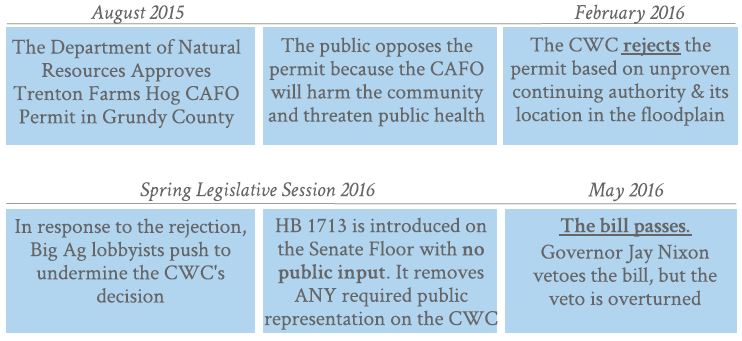Opposing any regulation that may cut into its profits,the industrial meat production sector has a disturbingly close tie to the public commission that oversees water protections in Missouri. The factory farm lobby has focused its efforts on compromising our state Clean Water Commission which certifies the industry’s permits. A new state law has removed the legal requirement for public representation on the commission. This new law works to ensure cheap meat profits at the expense of our natural resources, public health, and rural economies.
Concentrated Animal Feeding Operations or CAFOs are encolosed warehouse-type structures or barns in which animals are bred and contained while they produce dairy and eggs or until slaughter for meat. Learn about the harms of these massive livestock operations to public health, the environment, animal welfare, and our rural economies on MCE’s website or from our friends at the Missouri Rural Crisis Center. We connect the dots in the timeline image below and in our June 2016 Clean Water Reflections blog piece.
Corporate factory farm interests have pushed through state legislation (HB 1713) that removes required public representation on the Clean Water Commission (CWC). Governor Greitens has the ability to select public representatives over special interests. Your calls make a difference. Take Action here!
What is the Clean Water Commission?
The Clean Water Commission is a seven-member citizens’ board appointed by the governor and confirmed by the Senate. Its responsibilities include prevention and control of potential sources of pollution, the enforcement of the federal Clean Water Act, and the certification of Concentrated Animal Feeding Operations (CAFOs), or Factory Farms as they are commonly known. There is likely a CAFO closer to your home than you think. Check out our interactive map of factory farms in Missouri and Illinois to explore the growing factory farm landscape in our region. Read Clean Water Reflections blog post from June 2016 detailing the events leading up to the dismantling of public representation on our state Clean Water Commission.
MCE’s Interactive CAFOs Map
HB 1713 Timeline

Until 2016, it was mandatory for the public to hold the majority of the seats on the Commission, not special interests.
The timeline conveys the strategic and retaliatory CAFO industry assault on the CWC through the series of events in 2016. MCE’s Clean Water Reflections blog covered the details of the saga in an article written immediately following the 2016 legislative session.
Water is a public resource we all depend on. Citizens should have a voice in protecting it. Take action now to tell the governor to keep four public representatives on the commission!
Watch our short video Stop Corporate Takeover of Clean Water
